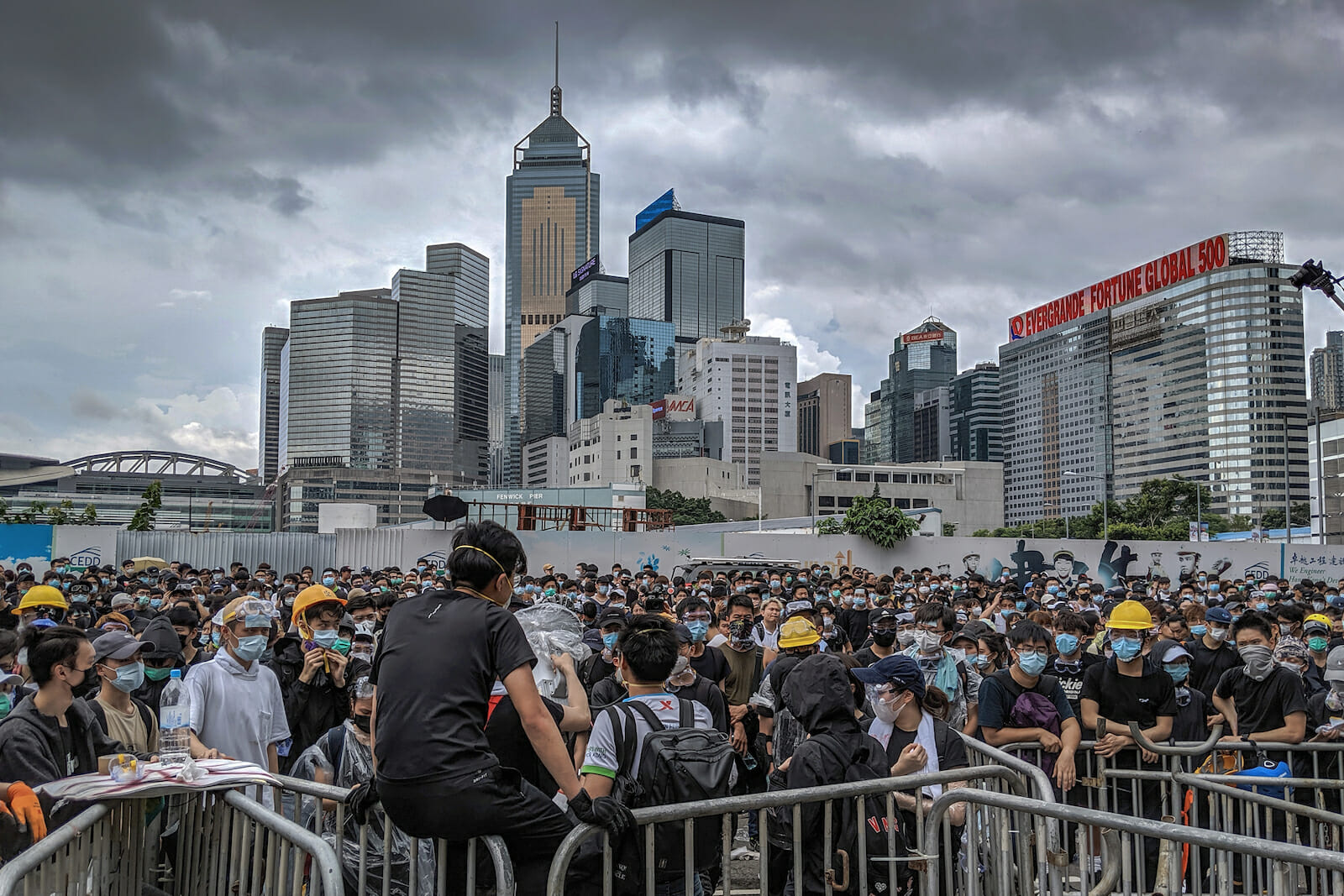
Hong Kong: Is the Global City Gone?
At the beginning of July, Hong Kong made the first arrests under its controversial new National Security Law (NSL). According to a tweet by the Hong Kong police, some 370 people were arrested for protests against the law, and ten persons were arrested for actually breaching the law.
The police tweeted photos of confiscated signs calling for an independent Hong Kong and noted that three women had been arrested for breaching the provision of the NSL against organizing, planning, or participating in secessionist activities. In other words, Hong Kong’s youngsters who had been used to the liberties of the democratic world must suddenly confront a Leninist state’s restrictive measures.
According to the law, some of those who violate it could be extradited to the mainland and punished and tried there. One small mercy is that it won’t be applied retroactively to protesters and activities before the law came into force. The move has been heavily criticized by the U.S. and Western countries. The British ambassador to the UN in Geneva, Julian Braithwaite, told the UN Human Rights Council in a statement that the legislation has “strong consequences for the human rights of the citizens of Hong Kong.” It was in violation of the 1992 Joint Declaration, a legally binding treaty registered with the UN, which guaranteed the city “a high degree of autonomy and rights and freedoms.”
Three females were arrested respectively for showing materials with #HKIndependence slogans in #CausewayBay, violating #NSL. Anyone who organises, plans, commits or participates in committing secession or undermining national unification shall be guilty of an offence. pic.twitter.com/SB3vYQyiha
— Hong Kong Police Force (@hkpoliceforce) July 1, 2020
Considering its own fascination with “secession” and “sedition,” it was not surprising that India preferred to soft-pedal the topic at the meeting and came up with an anodyne statement saying that it had “heard several comments (at the meeting on developments in Hong Kong)” and hoped that “these views would be taken into account by the relevant parties and handled appropriately.”
On June 30th, the Standing Committee of the National People’s Congress of China passed the law banning – “secession, subversion, sabotage, and cooperation with internal or external powers that threaten national security.” The law was then attached to Annex III of the Basic Law of Hong Kong and came into effect later that day. The legislation has a wide-ranging scope of authority and can be applied not only to permanent residents and enterprises in the region, but also to people and activities anywhere that are deemed offences against the Hong Kong Special Administrative Region.
Zhang Xiaoming, executive director of the Hong Kong and Macau Affairs Office, spoke to the media in Beijing insisting that the law would not target the pro-democracy camp but focus on a narrow band of crimes against national security. He rejected claims that the legislation was meant to disqualify candidates for November’s upcoming legislative council elections.
In Beijing, the Chinese authorities must be pleased with themselves. Rather than possibly millions taking to the streets, they have had to deal with just thousands so far, and they have been able to comfortably contain these demonstrations. Considering the hostile climate that Beijing built for itself by simultaneously taking on the U.S., India, Australia, Canada, and the UK, this must be some relief.
So far there has been little reaction to the Chinese move, besides statements. However, well before the law was actually passed, the U.S. had given sufficient warning that China would have to face consequences. First, it will affect the special status which Hong Kong enjoys under U.S. law. It applies to the 1992 Hong Kong Policy Act, which acknowledged the special status of the city as a separate legal entity from mainland China. It means that Hong Kong’s separate care under export, customs, and extradition controls may be terminated.
Second, the 2019 Hong Kong Law on Human Rights and Democracy, which amended the Hong Kong Policy Act, required an annual examination to test if Hong Kong had adequate autonomy to warrant the special treatment provided by the U.S. It also entailed penalties against any officials considered responsible for violating the city’s human rights. U.S. Secretary of State Mike Pompeo announced in May that he was no longer willing to recognize the sovereignty of Hong Kong under the amended legislation. President Trump announced the U.S. would initiate the process of suspending exemptions for Hong Kong.
In late May, in addition to a declaration to block Chinese students participating in the PRC’s Civil-Military Fusion programs, President Trump announced that in reaction to the new security legislation, the U.S. will begin to end Hong Kong’s preferential treatment in trade and travel. He attacked China for smothering the freedoms of Hong Kong, and called the developments “a tragedy.” He said sanctions would be imposed on officials from China and Hong Kong who were believed to be involved in eroding the autonomy of the territory.
Pompeo and Commerce Secretary Wilbur Ross said that they would begin the process of officially ending the special status of Hong Kong under U.S. law. There will be export control regimes between those affected. The license exemptions will be revoked for exports of dual-use goods to Hong Kong; they will now be handled under the same regulation that deals with mainland China. Such reforms could see higher tariffs on Hong Kong goods, stricter visa requirements, termination of extradition obligations, and so on.
The U.S. Senate at the beginning of July adopted the draconian Hong Kong Autonomy Act which had passed the House of Representatives a day earlier. This targets Chinese officials who are implementing the National Security Law, as well as banks and companies that are doing business with it. All of these steps, cumulatively, may see a rapid decline in Hong Kong as a world financial pillar and a big entry point for China.
But Beijing seems ready to push ahead with the illusion that the price it is paying is worth nipping the Hong Kong movement in the bud. The main explanation for this was the fear that the demonstrations in Hong Kong were morphing into a movement that demanded independence and self-rule, something that could have influenced the mainland. The new security legislation should have been passed at the NPC’s March meeting, but was postponed due to the outbreak of COVID-19. It was clear that Beijing was preparing to crack down on two main personnel changes that it made in relation to Hong Kong.
Xia Baolong, vice president and general secretary of the Chinese People’s Political Consultative Conference (CPPCC), was appointed director of the Hong Kong and Macau (HKMAO) office in February, while his predecessor, Zhang Xiaoming, became executive deputy director. Xia is close to Xi Jinping, who was the former party chief of Zhejiang province. In the mid-2000s he was Xi’s deputy chief for four years.
Luo Huining, former party chief in the provinces of Shanxi and Qinghai, succeeded Wang Zhimin as head of the Hong Kong liaison bureau earlier in January. Wang was moved within the Central Committee to the History Research Unit.
It was clear with these changes that Beijing was planning to take a tough line on Hong Kong for some time now. Now it has emerged that the decision to crack down was taken at the 4th Plenum in October 2019. Chinese Vice-Premier Han Zheng announced this detail to the CPCC delegates in Hong Kong in late May. Beijing claimed that the U.S. and Taiwan fanned the flames in Hong Kong and tried to turn the character of the demonstrations into demands for self-government and even independence. The U.S. passed the Hong Kong Human Rights and Democracy Act in November, which gave the president the authority to enforce economic sanctions on the region.

